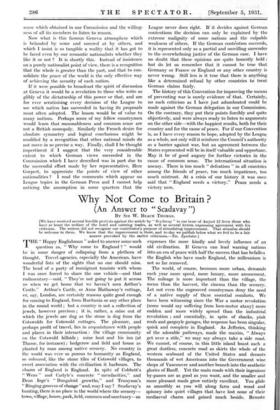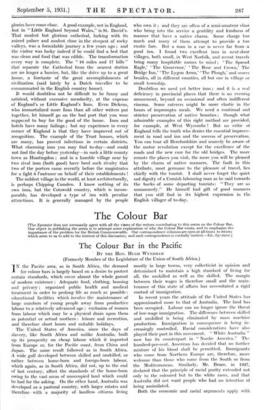Why Not Come to Britain ?
(An Answer to " S cadavay
J.5)
BY SIR W. BEACH THOMAS.
[We have received several forcible protests against the article by " Scalavay " in our isms of August 22 from those who have at heart the welfare of the hotel and catering trades, as well as several letters expressing agreement with his criticism. The writers did not recognize our contributor's purpose of stimulating improvement. That stimulus should be welcome to them. We know that the improvement is there, and to-day we publish below what we feel to be a fair
answer provoked by the earlier criticisms.—En. Spectator.] T"" Happy Englishman " asked to answer some such question as, " Why come to England ? " would be in some danger of collapsing from a plethora of thought. Travel agencies, especially the American, have wonderful lists of the sights that no one should miss. The head of a party of immigrant tourists with whom I was once forced to share the one vehicle—and that rudimentary—said, " They're not going to put it across us when we get home that we haven't seen Arthur's Castle." Arthur's Castle, or Anne Hathaway's cottage, or, say, London, are certainly reasons quite good enough for coming to England, from Ruritania or any other place in the round world ; but a country is not a collection of jewels, however precious ; it is, rather, a mine out of which the jewels are dug as the stone is dug from the Cotswolds for Cotswold cottages. The pleasure, and perhaps profit of travel, lies in acquaintance with people and places in their interaction : the village community on the Cotswold hillside ; mine host and his inn (at Thame, for instance) ; hedgerow and field and house as planted by man among native scenery. No country in the world was ever so porous to humanity as England, so coloured, like the stone tiles of Cotswold villages, to sweet association with the civilization it harbours. The charm of England is England. In spite of Cobbett's " Wens " and Carlyle's concrete " mendacities," and Dean Inge's " Bungaloid growths," and Tennyson's "Ringing grooves of change " and, may I say ? Scadavay's bunting, there is no place in the world where the scenery— town, village, house, park, field, common and sanctuary—so expresses the more kindly and lovely influence of an old civilization. If Geneva can lead warring nations into an era of peace with half the success that has befallen the English who have made England, the millennium is not so far removed.
The world, of course, becomes more urban, demands each year more speed, more luxury, more amusement. The mileage is more important than the village, the menu than the harvest, the cinema than the scenery. Let not even the engrooved countryman deny the need of a native supply of these essential comforts. We have been witnessing since the War a motor revolution (some would say suffering from loco-motor ataxy) more sudden and more widely spread than the industrial revolution ; and essentially, in spite of shacks, pink roofs and gargoyle garages, the response has been singular, quick and complete in England. As Jefferies, thinking of the adorable pathways, made the maxim, " Always get over a stile," we may say always take a side road. We cannot, of course, in this little island boast such a great dustless, concrete road as skirts the whole of the western seaboard of the United States and decants thousands of wet Americans into the Government wine shops of Vancouver and another branch into the aesthetic glories of Banff. Yet the main roads with their ingenious by-passes are as good as you want, and the smaller and more pleasant roads grow entirely excellent. You glide as smoothly as you will along farm and wood and spinney into quiet villages that have lost none of their mediaeval charm and gained much beside. Remote glories have come close. A good example, not in England, .but in " Little England beyond Wales," is St. David's. That modest but glorious cathedral, lurking with its ruined palace and modest close in the steepest of rocky valleys, was a formidable journey a few years ago ; and the visitor was lucky indeed if he could find- a bed that n-as clean and food that was edible. The transformation every way is complete. The " 16 miles and 17 hills " that separate the Cathedral from the nearest station are no longer a barrier, but, like the drive up to a great house, a foretaste of the great accomplishments of civilization (said lately by a Dutch traveller to be consummated in the English country house).
It would doubtless not be difficult to be funny and satirical, without excessive mendacity, at the expense of England's or Little England's Inns. Even Dickens, who immortalized more Inns than all other writers put together, let himself go on the bad port that you were supposed to buy for the good of the house. Inns and hotels have many failings ; but my experience in every Corner of England is that they have improved out of recognition. The example of the Trust houses, which are many, has proved infectious in certain districts. What charming inns you may find to-day—and could not find the day before yesterday—in such a little county town as Huntingdon ; and 'in a humble village near by two rival inns (both good) have bred such rivalry that two of the porters came recently before the magistrates for a fight a routrance on behalf of their establishments !
The noblest village in the world, at least architecturally, is perhaps Chipping Camden. I know nothing of its own inns, but the Cotswold country, which is incom- parable, has developed a type of inn with peculiar attractions. It is generally managed by the people who own it ; and they are often of a semi-amateur class who bring into the service a gentility and kindness of manner that have a native charm. Some charge too much and many of them attempt to provide a too exotic fare. But a man in a car is never far from a good inn. I found two excellent inns in next-door villages, both small, in West Norfolk, and recent travels bring many hospitable names to mind ; The Spread Eagle,' The Grosvenor," The Rose and Crown,' The Bridge Inn,' `The Lygon Arms," The Plough,' and scores besides, all in different counties, all but one in village or small township.
Doubtless we need yet better inns ; and it is a real deficiency in provincial places that there is no evening amusement, beyond an occasional and often indifferent cinema. Some caterers might be more elastic in the hours of impromptu meals. We need a continual and stricter preservation of native beauties ; though what admirable examples of this right method are provided, for example, at West Wycombe ! But no critic of England tells the truth who denies the essential improve- ment in road and inn and the success of preservation. You can tour all Herefordshire and scarcely be aware of the motor revolution except for the excellence of the roads and the new care for the old bridges. The more remote the places you visit, the more you will be pleased by the charm of native manners. The fault in this attribute, most germane to the pleasure of travel, lies chiefly with the tourist. I shall never forget the quiet sad dignity of a Cornish labouring man as he said towards the backs of some departing tourists : " They are so unmannerly." He himself had gift of good manners that you still find in its highest expression in the English villager of to-day.































 Previous page
Previous page